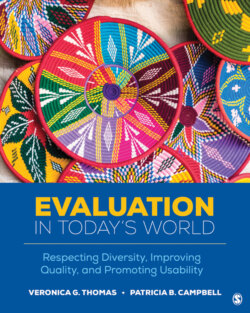Читать книгу Evaluation in Today’s World - Veronica G. Thomas - Страница 158
На сайте Литреса книга снята с продажи.
Eleanor Chelimsky
ОглавлениеEleanor Chelimsky has been described as a guiding light in the field of evaluation since its inception as a profession, with several decades of experience conducting evaluations of government policies and programs, developing methodologies to respond to complex questions meaningfully, and transferring her knowledge to the evaluation community at large both domestically and internationally (Oral History Project Team, 2009). From 1966 to 1970, she was an economic analyst for the U.S. Mission to NATO, charged with statistical, demographic, and cost-benefit studies. Subsequently, from 1970 to 1980, she worked at MITRE Corporation, where she directed work in evaluation planning and policy analysis, criminal justice, and research management. Between 1980 and 1994, Chelimsky directed the Program Evaluation and Methodology Division of the U.S. GAO whose mission was to serve Congress through evaluations of government policies and programs and through the development and demonstration of methods for evaluating those policies. Chelimsky’s influence on evaluation, particularly at the federal level, has been enormous. In her position at the GAO, she pioneered the use of meta-analysis as a tool for providing program evaluation and other legislatively significant advice to Congress (Chelimsky, 1994). Chelimsky received many awards for her work, including the GAO’s top honor, “the Comptroller General’s Award,” for contributions in developing innovative approaches to evaluate the effects of government programs and fostering their use by the GAO and other decision makers in the United States and abroad.
Chelimsky has been a leader in the evaluation profession serving as president of the Evaluation Research Society in 1980 and of the AEA in 1995. She has been credited with producing nearly 300 evaluations of government policies and programs for Congress, as well as developing and demonstrating new methods for evaluation. In response to a question about evaluation’s future, Chelimsky responded that she would stress two things:
We [first] should not be producing so many ‘‘johnny-one-notes,’’ … evaluators who show up for work knowing only one methodology (usually survey research or the randomized field experiment)…. [E]valuators need to know how economists, engineers, and political scientists … deal with evaluation questions in their different disciplines….
[Second] I would stress the study of context…. [S]o long as we try to force-fit evaluative ideas into political or social milieux without understanding those milieux we’ll never get them in…. [W]e need to understand bureaucracy if we want government to listen to us, we need to understand other evaluative professions both to borrow their methods and let them borrow ours…. Evaluation really has to fit in … and we must find partners, even though speaking truth to power is not calculated to bring us advocates. Perhaps the best way to do this is by avoiding zealotry, whether about methods or anything else…. If we can remember that there is no such thing as perfection, I think we’ll survive, find allies, flourish, and do an amazing job in helping to make government more transparent, more effective, and more publicly accountable. (Oral History Project Team, 2009, p. 244)
